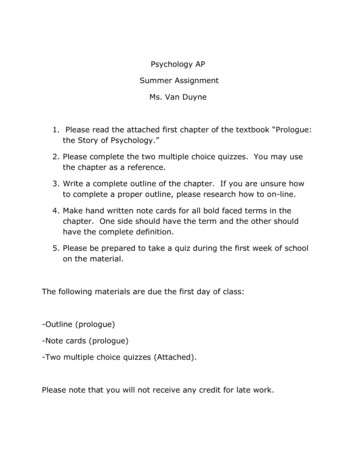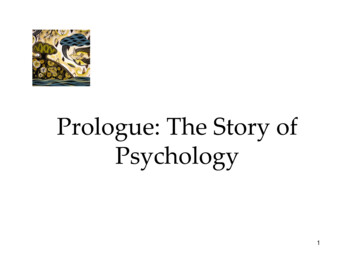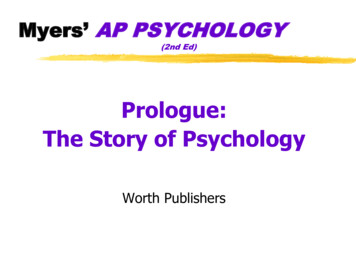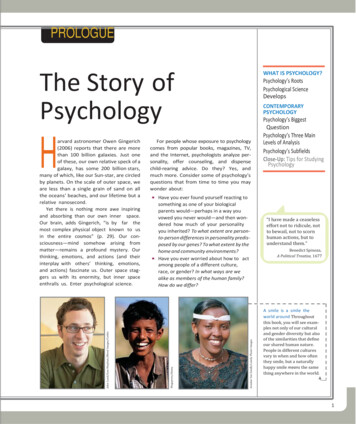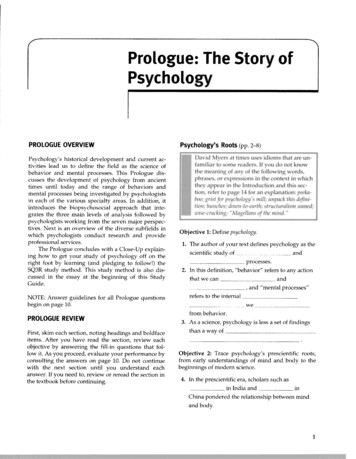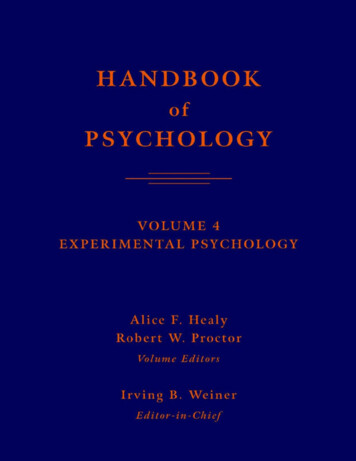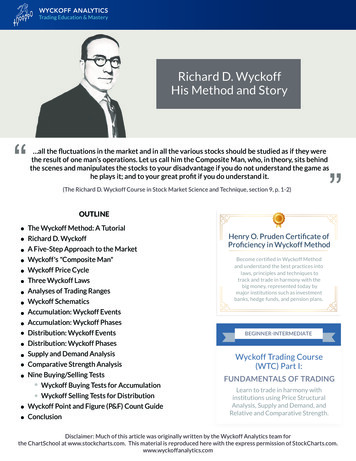
Transcription
PSYCHOLOGY(8th Edition)David MyersPowerPoint SlidesAneeq AhmadHenderson State UniversityWorth Publishers, 2006Prologue: The Story ofPsychologyPrologue: The Story of PsychologyPsychology’s Roots Prescientific Psychology Psychological Science is Born Psychological Science Develops31
Prologue: The Story of PsychologyContemporary Psychology Psychology’s Big Debate Psychology’s Three Main Levelsof Analysis Psychology’s Subfields4Psychology’s RootsPrescientific Psychologywww.bodydharma.org/photo/buddha.jpgIn India, Buddha wondered how sensations andperceptions combined to form ideas.5Prescientific PsychologyConfucius (551‐479 .jpgIn China, Confucius stressed the power of ideasand of an educated mind.62
Prescientific PsychologyHebrew e.jpgHebrew scriptures linked mind and emotion to thebody.7Prescientific aw.umkc.eduSocratesSocrates (469‐399 B.C.) and Plato (428‐348 B.C.)Socrates and his student Plato believed the mindwas separate from the body, the mind continued toexist after death, and ideas were innate.8Prescientific PsychologyAristotle (384‐322 B.C.)http://faculty.washington.eduAristotle suggested that the soul is not separablefrom the body and that knowledge (ideas) growfrom experience.93
Prescientific PsychologyRene Descartes .comDescartes, like Plato, believed in soul (mind) bodyseparation, but wondered how the immaterialmind and physical body communicated.10Prescientific PsychologyFrancis Bacon (1561‐1626)http://www.iep.utm.eduBacon is one of the founders of modern science,particularly the experimental method.11Prescientific PsychologyJohn Locke (1632‐1704)biografieonline.it/img/bio/John Locke.jpgLocke held that the mind was a tabula rasa, orblank sheet, at birth, and experiences wrote on it.124
Prescientific PsychologyWhat is the relation of mind to the body?Mind and body areconnectedMind and body aredistinctThe rescientific PsychologyHow are ideas formed?Some ideas are inbornThe mind is a al Science is BornStructuralismTitchner (1867‐1927)Wundt (1832‐1920)Wundt and Titchner studied the elements (atoms)of the mind by conducting experiments at Leipzig,15Germany in 1879.5
Psychological Science is BornFunctionalismMary CalkinsJames (1842‐1910)Influenced by Darwin, William James establishedthe school of functionalism, which opposed16structuralism.Psychological Science is BornThe Unconscious MindFreud (1856‐1939)Sigmund Freud and his followers emphasized theimportance of the unconscious mind and its effects17on human behavior.Psychological Science DevelopsBehaviorismSkinner (1904‐1990)Watson (1878‐1958)Watson (1913) and later Skinner emphasized thestudy of overt behavior as the subject matter of18scientific psychology.6
Psychological Science DevelopsRogers yweb.cortland.eduMaslow (1908‐1970)Humanistic PsychologyMaslow and Rogers emphasized currentenvironmental influences on our growth potential19and our needs for love and acceptance.Psychology TodayWe define psychology today as the scientificstudy of behavior (what we do) and mentalprocesses (inner thoughts and feelings).20Psychological Associations &SocietiesThe American Psychological Association is thelargest organization of psychology with 160,000members world‐wide, followed by The BritishPsychological Society with 34,000 members.217
Psychology’s Big DebateNature versus NurtureDarwin (1809‐1882)Darwin stated that nature selects those that bestenable the organism to survive and reproduce in a22particular environment.Psychology’s Three Main Levels ofAnalysis23Psychology’s Current PerspectivesPerspectiveFocusSample QuestionsNeuroscienceHow the body and brainenables emotions?How are messagestransmitted in the body? Howis blood chemistry linked withmoods and motives?EvolutionaryHow the natural selectionof traits the promotes theperpetuation of one’sgenes?How does evolution influencebehavior tendencies?Behavior genetics How much our genes andour environmentsinfluence our individualdifferences?To what extent arepsychological traits such asintelligence, personality,sexual orientation, andvulnerability to depressionattributable to our genes? Toour environment?248
Psychology’s Current PerspectivesPerspectiveFocusSample QuestionsPsychodynamicHow behavior springsfrom unconscious drivesand conflicts?How can someone’spersonality traits anddisorders be explained interms of sexual andaggressive drives or asdisguised effects of unfulfilledwishes and childhoodtraumas?BehavioralHow we learn observableresponses?How do we learn to fearparticular objects orsituations? What is the mosteffective way to alter ourbehavior, say to lose weight orquit smoking?25Psychology’s Current PerspectivesPerspectiveFocusSample QuestionsCognitiveHow we encode, process,store and retrieveinformation?How do we use informationin remembering? Reasoning?Problem solving?Social‐culturalHow behavior andthinking vary acrosssituations and cultures?How are we — as Africans,Asians, Australians or NorthAmericans – alike as membersof human family? As productsof different environmentalcontexts, how do we differ?26Psychology’s Subfields: vePersonalitySocialWhat she doesExplore the links between brain andmind.Study changing abilities from womb totomb.Study how we perceive, think, and solveproblems.Investigate our persistent traits.Explore how we view and affect oneanother.279
Psychology’s Subfields: ResearchBiological9.9%Other ics5.5%Cognitive8.0%Social 21.6%Personality4.8%Data: APA 199728Psychology’s Subfields: AppliedPsychologistWhat she doesStudies, assesses, and treats people withpsychological disordersClinicalCounselingHelps people cope with academic,vocational, and marital challenges.EducationalStudies and helps individuals in schooland educational settingsIndustrial/OrganizationalStudies and advises on behavior in theworkplace.29Psychology’s Subfields: 5%Clinical67%Data: APA 19973010
Clinical Psychology vs. PsychiatryA clinical psychologist (Ph.D.) studies, assesses,and treats troubled people with psychotherapy.Psychiatrists on the other hand are medicalprofessionals (M.D.) who use treatments like drugsand psychotherapy to treat psychologicallydiseased patients.31Close‐upYour Study of PsychologySurvey, Question, Read, Review and Reflect (SQ3R) Survey: What you are about to read, including chapteroutlines and section heads.Question: Ask questions. Make notes.Read: Make sure you read outlines, sections andchapters in entirety.Review: Margin definitions. Study learning outcomes.Reflect: On what you learn. Test yourself with quizzes.32Close‐upAdditional Study Hints Distribute your time.Listen actively in class.Overlearn.Be a smart test‐taker.3311
Prologue: The Story of Psychology Contemporary Psychology Psychology’s Big Debate Psychology’s Three Main Levels of Analysis Psychology’s Subfields 5 Psychology’s Roots Prescientific Psychology www.bodydharma.org/photo/buddha.jpg In India, Buddha wondered how sensations and perceptions combined to form ideas. 6
